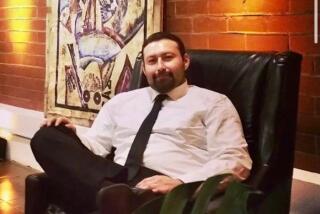Jury Weighs Fate of Deputy’s Killer
- Share via
When Michael Raymond Johnson fatally shot Deputy Peter J. Aguirre in July 1996 he robbed a wife of her husband, a mother of her son and a little girl of her father.
And for that, prosecutors argued Wednesday, he deserves to die.
“That day changed many lives,” Deputy Dist. Atty. Maeve Fox told the jury. “It changed the lives of his parents, his family and his fellow officers. . . . [Johnson] took away their hope, their love, their life.
“Unless Michael Johnson receives the death penalty,” she said, speaking over the sobs of Aguirre’s widow, “it won’t change his life at all.”
Later, defense attorney Todd Howeth stood before the jury and begged for his client’s life.
“I’m pleading for another person’s life,” Howeth said, his voice trembling. “It’s intimidating. It’s awesome. And it makes me feel very inadequate.
“I’ve watched you as Peter Aguirre’s family testified,” he told the jury. “Some of you wept openly. Some shifted in your seats. Some of you turned away because it was too much to bear. I could see the tears in your eyes, and the anger and pain on your faces.
“You have a right to feel rage,” he told them. “But please do not let your emotion overwhelm you.”
He pounded his fist on the podium.
“It is not warranted.”
Six and a half hours of closing arguments Wednesday concluded the 11-day penalty phase of Johnson’s trial. At 4:30 p.m. jurors were sent from the courtroom to decide whether the 50-year-old Vietnam veteran should live the rest of his life in prison, or be executed by lethal injection.
Last month, the same jurors deliberated one day before convicting Johnson of first-degree murder for fatally shooting Sheriff’s Deputy Peter J. Aguirre. The 26-year-old deputy was shot four times when he responded to a domestic-disturbance call in Meiners Oaks, and died before he ever got his gun out of the holster.
Johnson fired the final bullet at point-blank range into Aguirre’s head.
The prosecution sought to paint Johnson as a cold-blooded, callous and violent man with a lust for power, who clearly knew the difference between right and wrong.
“We ask you to say to Mr. Johnson. . . . ‘The act you committed is so random, so senseless, so brutal, so cruel, so utterly base that you must pay for it,’ ” Fox told jurors.
Acknowledging that killing Aguirre was a “horrible” crime, defense attorneys tried to portray Johnson as a man overwhelmed by a debilitating mental illness who desperately tried to turn his life of crime and drug addiction around in the months leading up to the killing.
“If killing Michael Johnson could undo all the harm he has done, this would be simple and uncomplicated,” Howeth said. “But the loss cannot be given back, the pain cannot be erased. The suffering cannot be undone.”
Johnson was unusually pale as he sat at the defense table. He leaned forward only when Howeth gave the final closing argument.
Top brass from the Ventura County Sheriff’s Department crowded into the front row closest to the jury, with Sheriff Larry Carpenter sitting through closing arguments by Deputy Dist. Atty. Matt Hardy and Maeve Fox.
The Aguirre family was seated behind them.
On the right side of the courtroom sat Johnson’s mother and brother, and several lawyers from the district attorney’s office.
In a sea of dark suits, Johnson’s mother, Aguirre’s wife, and Fox all wore red.
At one point when Hardy told the jury that Johnson was a “cold-blooded, callous, rotten” person, whose mother had to constantly step in to keep him out of trouble, Wilma Johnson stood and shook her fist.
“I do not have to hear this . . . !” she said, and stormed out of the courtroom.
At the next break Judge Steven Z. Perren admonished all present that “any deliberate shows of emotion will not be tolerated.”
Howeth ended his impassioned plea for Johnson’s life with the story of John Newton, an 18th-century English slave trader.
As Howeth told the tale, after years of packing slaves into his ships like books, Newton became so repulsed by his vocation that he abandoned his work and became a minister. He wrote a song about his transformation: “Amazing Grace.”
Howeth recited the words.
“I wish that melody, that song, that hymn, will go back into the jury room with you,” he said to the jury, his voice cracking with emotion. “It is not necessary to sentence this man to execution. Life without the possibility of parole is enough.”
More to Read
Sign up for Essential California
The most important California stories and recommendations in your inbox every morning.
You may occasionally receive promotional content from the Los Angeles Times.













